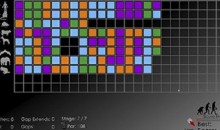Lost Planet: When Planets Go Rogue
Lost Planet. Not just a video game or low budget sci-fi movie from the 60’s, it appears that this phenomena, known as a rogue planet, is not only an actual occurrence but one that may in fact be as close to home as Vulcan.
Rogue planets are planets that have been ejected from their systems of birth like mighty Hephaestus of Greek lore. It happens either when the host star loses so much mass that its gravity is altered, destabilizing the orbit of its planet, or when the fledgling gravity wells of a newborn system interact with each other whilst jockeying for a stable orbit. The interplanetary nursery is like a battle royal.
Recently, exoplanetary astronomers (sounds freakin cool don’t it?) have imaged a planet with no star. Blandly dubbed CFBDSIR2149, it is the first confirmed report of a rogue planet. The key word there is “confirmed” as astronomers are uncertain if previous candidates were indeed planets, or were just brown dwarfs.
A brown dwarf star is the stellar equivalent to a YouTube sensation. Big enough to be huge (>13x more massive than Jupiter) but not big enough to become an actual star (~75-80x more massive than Jupiter). It also has fusion like a star, but not enough to fully ignite and sustain itself.
I mentioned that a planet going rogue is a phenomena that hits close to home, and the truth is that we may have lost a planet of our very own. Last year, astrophysicist Dr. David Nesvorny was modeling the early formation of the solar system. The gravitational instability of the early years of our neighborhood caused the separation of the rocky (inner) planets, the gas (outer) planets, and the tiny icy (kuiper belt) dwarf planets. The problem was that the simulations dictated that with only 4 outer gas giants (Jupiter, Saturn, Uranus and Neptune) Uranus or Neptune would be ejected every time by Jupiter’s gravity.
Obviously that is not the present case as both those planets are still very much here. Dr. Nesvorny considered that maybe there were more than the four. He plugged a fifth gas giant (about the size of Uranus or Neptune) and bingo! Everything came together to its present setup.
Long story short, it seems we kicked a planet to the curb.
Now, I’m one for the odd bit of fun speculation. So lets say we did once have an extra planet, and it was ejected by Jupiter’s gravity. Cast out like Hephaestus was by Zeus. Most of the planets are named after roman gods (Uranus being the exception), who were based off the Greek gods pretty closely. The question is, what’s the roman equivalent of Hephaestus? The answer is what makes every ounce of my inner nerd squee with joy… VULCAN!
So let us search the cosmos for our missing Vulcan, and develop the technologies to visit this lonely lost planet so that we may better understand the beginnings of our planetary system. And of course, so that we can actually say, “Set course for Vulcan” with a smirk and a swagger!









Kinda sounds like “Planet X”